Hawaii House leaders vow to clear Hawaiian Home Lands backlog, raise minimum wage and decommission Red Hill
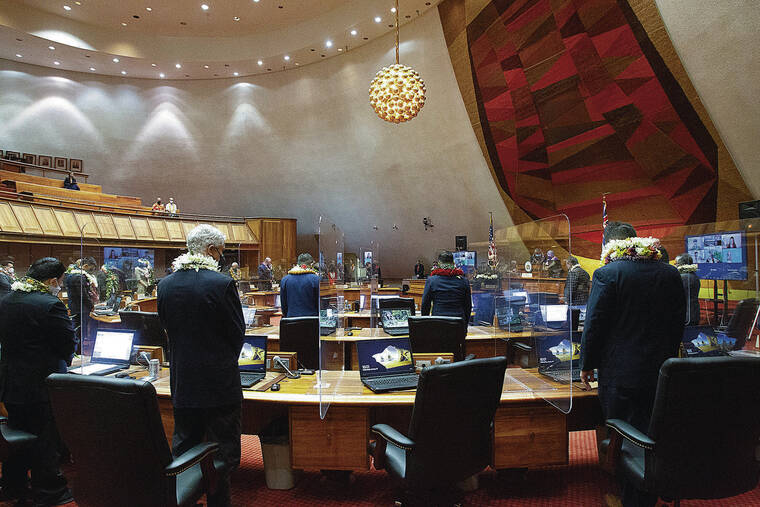
CINDY ELLEN RUSSELL / CRUSSELL@STARADVERTISER.COM
Members of the state House of Representatives stood during an invocation by Majority Floor Leader Dee Morikawa (D, Niihau-Koloa-Kokee) at the opening of the 2022 legislative session Wednesday at the state Capitol.
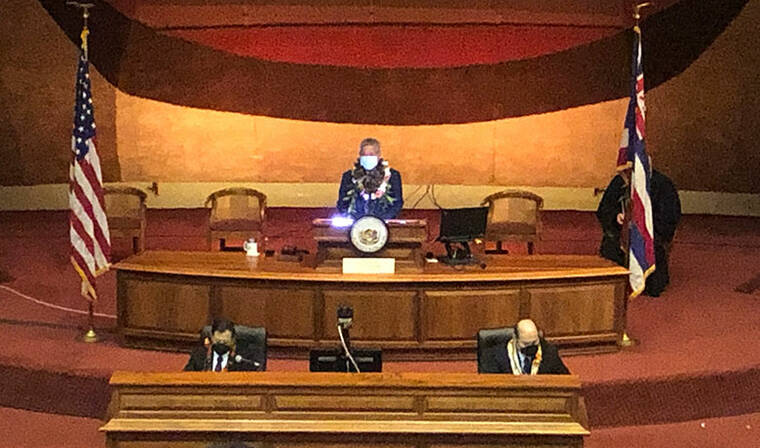
CRAIG T. KOJIMA / CKOJIMA@STARADVERTISER.COM
State House Speaker Scott Saiki is pictured at the podium during the Opening Day ceremony of the legislative session for the House.
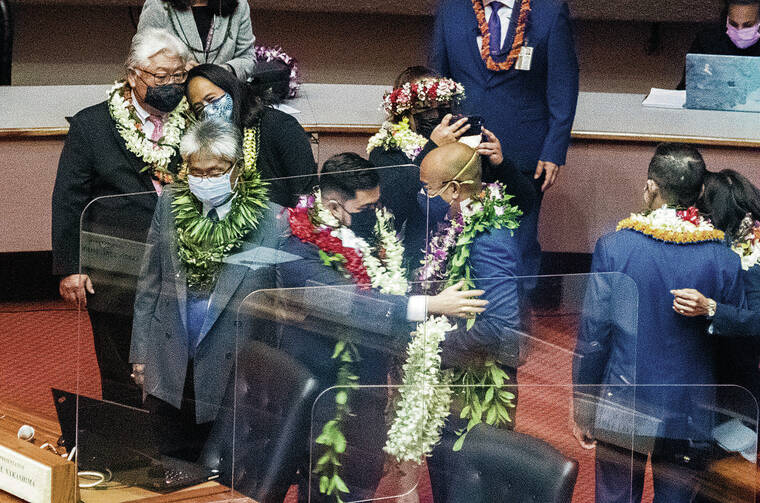
CRAIG T. KOJIMA/CKOJIMA@STARADVERTISER.COM
Members of the state House of Representatives greeted each other during a recess on Wednesday.
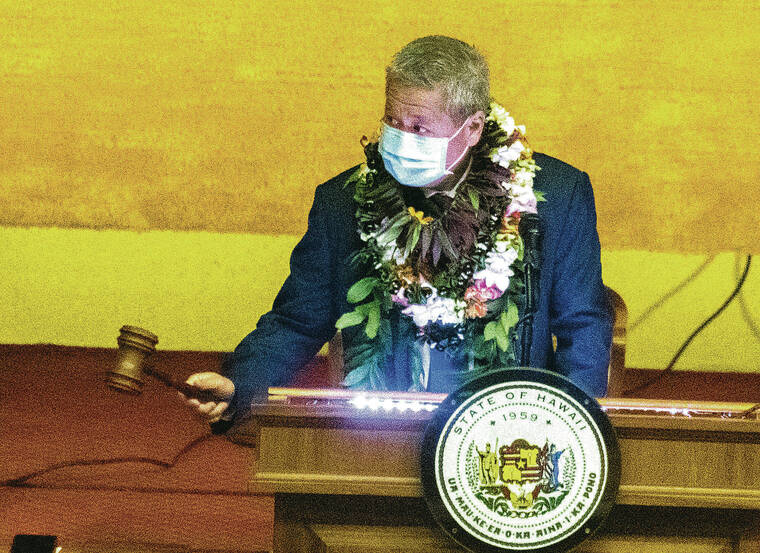
CRAIG T. KOJIMA/CKOJIMA@STARADVERTISER.COM
House Speaker Scott Saiki struck a gavel to start the legislative session.
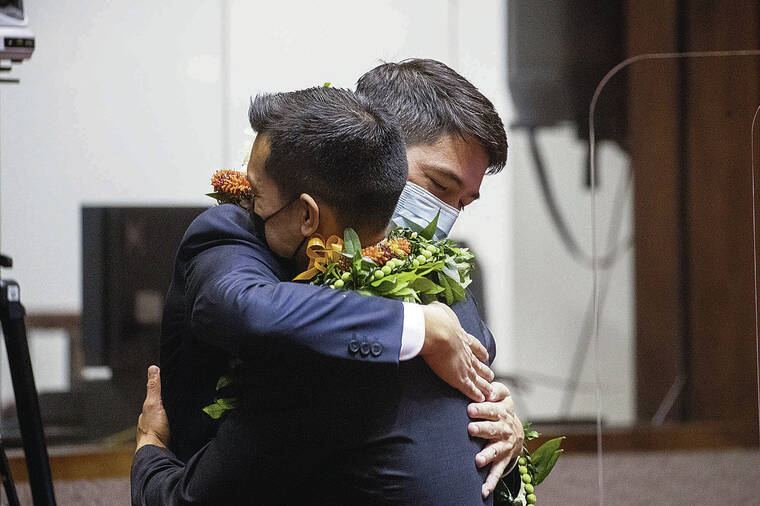
CRAIG T. KOJIMA/CKOJIMA@STARADVERTISER.COM
Rep. Sean Quinlan embraced a colleague after presenting lei.





Leaders in the state House of Representatives set a high bar Wednesday on the Opening Day of the new legislative session by proposing $600 million to help clear the backlog of Native Hawaiians waiting to get into livable homes, raising Hawaii’s $10.10 an hour minimum wage and demanding the Department of Defense remove its fuel and tanks at Red Hill and decommission the system.
The marker laid down by state House Speaker Scott Saiki was met with applause, especially with the pledge to provide the Department of Hawaiian Home Lands with a one-time infusion of $600 million.
State Rep. Gene Ward (R, Hawaii Kai-Kalama Valley), an advocate for helping Native Hawaiians — especially to get them housed on their ancestral lands — then rose on the House floor and expressed his gratitude to Saiki.
Ward said he would “mark this day as a historical day for the people of Hawaii” — 100 years after the Hawaiian Homes Commission was founded.
Ward called the Opening Day of the new legislative session for the House “a new day for the people of Hawaii, particularly the Hawaiian community that’s on the wait list that is now 28,000 people strong. Thank you for what you’re doing …. Thank you speaker, mahalo, mahalo. This is a day that’s going to go down in history.”
Saiki called it a “historic piece of legislation.”
Don't miss out on what's happening!
Stay in touch with breaking news, as it happens, conveniently in your email inbox. It's FREE!
With tourism arrivals rebounding faster than expected — along with tax revenues — House Finance Chairwoman Sylvia Luke (D, Punchbowl-Pauoa-Nuuanu) told reporters “there is an opportunity for us to do great things this year and we shouldn’t miss that opportunity.”
Gov. David Ige has proposed setting aside $1 billion into the state’s Rainy Day Fund for future emergencies, an idea that is facing pushback from some members of the House and Senate.
Asked if the $600 million commitment for Hawaiian Home Lands will come from Ige’s Rainy Day Fund proposal, Luke said, “It’s not just the $1 billion. We will need to look at the total amount of the budget and what is available, but it is the single-largest commitment by the Legislature to address the 20,000 people on the wait list.”
In addition, Saiki addressed other Native Hawaiian cultural issues and said, “The House will expand community-based efforts to restore fish ponds and loi; repatriate cultural artifacts; teach financial literacy; and provide cultural training to the military.”
Saiki said the House also wants to increase the minimum wage to $18 an hour. He did not provide details on how many years it would take to get there, but said the largest increases likely would occur initially. The last increase to Hawaii’s minimum wage came in 2018.
The last hope for an increase came in January 2020 — just before COVID-19 took hold, crippling the economy, causing mass layoffs and illness and deaths.
“We were prepared to enact a proposal that would have increased the minimum wage and provided more tax relief to working families,” Saiki told the House on Wednesday. “This proposal followed a report conducted by the Aloha United Way that found that 47% of Hawaii’s families were financially distressed and simply could not make it here.
“But six weeks later, the legislative session was suspended when the state was shut down, and we were forced to defer action on our ambitious agenda.”
Along with increasing the minimum wage, Saiki said in his speech that the House will “increase the food tax credit, and make the Earned Income Tax Credit refundable and permanent. This package will give a family an additional $33,600 in income.”
Overall, Saiki said, “This year, the House is proposing unprecedented legislation that, taken together, will help over 100,000 households, provide homes and restore cultural practices that ordinary people have fought for, and even died for, throughout their lives.”
On other issues, Saiki said the House will address:
>> Tourism management. “We need to take action now before our visitor count again reaches 10 million. We need to better incorporate culture into tourism because by doing so, this will also protect our natural resources. We will do this by relying on initiatives and organizations that can assist the Hawaii Tourism Authority.”
>> Mauna Kea. Through a House working group, “to propose a new governance structure for Mauna Kea. … the House will advance a proposal that will create a management structure that will care for Mauna Kea above the 6,500-foot elevation line, through an integrated culturally and environmentally-conscious approach.”
>> Red Hill. “When it comes to the environment, just two words exemplify the need for environmental justice: Red Hill,” Saiki said. “In December, the House called for the de-fueling and decommissioning of Red Hill. … The House will not allow the military to put the aquifer that supplies water to all of Oahu’s residents at risk.”
State Rep. Dee Morikawa (D, Niihau-Koloa-Kokee) opened the House session with a prayer and asked members to “pray for the people of Tonga that they get through this very difficult time of tragedy and uncertainty. We pray for guidance as we begin another session. … We pray for all those affected by this unprecedented pandemic. … We ask for the strength to continue being the leaders that people depend on.”



